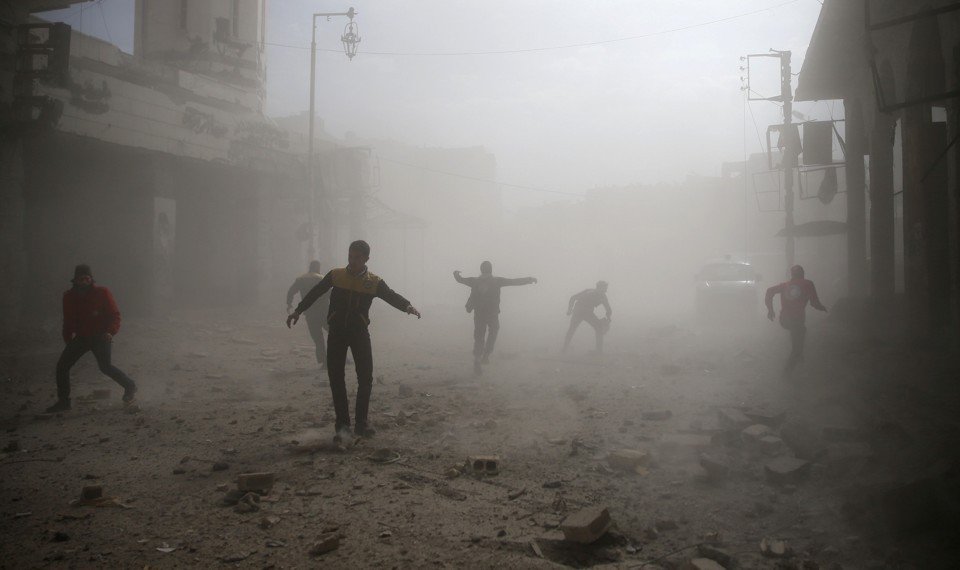West's crocodile tears over human rights in Ghouta

TEHRAN - The United Nations Security Council (UNSC) convened Thursday to draw up a draft resolution proposed by Sweden and Kuwait, demanding a 30-day truce in Syria to allow aid deliveries and medical evacuations in Syria’s Ghouta east of Damascus. Negotiations on the draft began on February 9.
The meeting comes as warplanes pounded eastern Ghouta for almost a week. U.N. Secretary-General Antonio Guterres appealed last Wednesday for an immediate end to “war activities” there.
The draft, which does not address the fight against Takfiri terrorists in Syria, didn’t receive Russia’s approval or vote.
A resolution needs nine votes in favor and no vetoes by Russia, China, the United States, Britain or France. Russia has cast 11 vetoes on possible Security Council action on Syria since its civil war began in 2011.
Russian Ambassador to the United Nations Vassily Nebenzia argued that the language of the draft was unrealistic and that the 15-member Security Council could not simply impose a truce on Syria without consulting the parties and proposed amendments to the resolution.
Meanwhile, Kuwait's U.N. Ambassador and the current council president, Mansour Al-Otaiba, called the draft “clear and simple” inasmuch as it asks for a 30-day cessation of fighting in the Ghouta, where 1,200 civilians have been killed.
Also, Sweden's U.N. Ambassador, Olof Skoog expressed frustration over not being able to close the gap completely among the council members and said "we all agree there needs to be a ceasefire”. Discussions continue on how to define its terms.
Syria’s Ghouta
Eastern Ghouta, an important strategic location in close proximity to Damascus International Airport, naturally offers a good location for Takfiri terrorist groups who have always been determined to gain control of the area, even at the cost of slaughtering thousands of civilians.
So far, Syrian army is in control of two-third of the country and the remaining one-third, in the hands of the Takfiri terrorists, has now been surrounded by Syrian forces whose plan is to remove the terrorists from the country forever. Withdrawal of extremists from Syria has been quite worrisome for the West and supporters of the terrorism who seek to undermine the legitimate Syrian government.
Western and Arab leaders, who themselves hold dark human rights record, have all of the sudden raised an outcry for humanitarian aid and ceasefire in Eastern Ghouta, one after the other. For instance, Saudi Arabia’s Foreign Ministry has recently issued a statement expressing concern over the continued Syrian regime's attacks on the eastern Damascus. The note which welcomed a ceasefire in Syria read, “The Syrian regime must stop violence and provide the ground for humanitarian assistance as the Syrian crisis is in dire need of getting addressed.”
Emirate's Foreign Ministry also made a similar response to the same issue in the Eastern Ghouta, and stressed the need for the entry of humanitarian assistance including food and drug supplies for the wounded. The United Arab Emirates, UAE, and Saudi Arabia hold same positions on the humanitarian situation in the Eastern Ghouta, while they have killed and wounded more than 35,000 Yemeni people over the past three years. It appears that Riyadh and Abu Dhabi hold very different views of human rights when it comes to Yemen versus Syria.
Western officials blame Damascus and its allies on the issue of Eastern Ghouta. The French ambassador to the United Nations Security Council said: “The draft Security Council resolution requires stopping any military action to respect human factors.”
“The bombing of the Eastern Ghouta with no consideration for civilians, the conditions to reach a political solution to the Syrian crisis should be provided. The situation in Syria shows that we must endlessly strive for a ceasefire in the Eastern Ghouta, otherwise we must inevitably have to prepare for worse conditions”, the Frenchman said.
Following the statements of the French representative to the UN Security Council, the Syrian Foreign Ministry sent two separate letters to the UN Secretary-General and the head of the Security Council of this organization. In its two letters, the ministry condemned French support for terrorism in Syria. It was only a year ago that the branch of the Swiss French company “Lafarge”, in Syria, explicitly acknowledged the support of ISIL weapons in the Middle Eastern country.
Meanwhile, the United States has also laid the blame on Damascus government, as it has done in the past. US ambassador to UN Nikki Haley made unequal claims against Damascus and Moscow during a Security Council summit. She ignored her country's support for Takfiri terrorists group in Syria, accusing Damascus and Moscow for killing civilians in the Eastern Ghouta.
Haley added that the United States is preparing a positive vote on the draft resolution.
In order to deceive public opinion and beautify the face of the United States in public opinion, she also said that the entry of medical and humanitarian assistance to the Eastern Ghouta should be allowed.
Americans, who show support for armed groups in Syria, are now turning into human rights advocates and shed crocodile tears for civilians in the Eastern Ghouta.
The Western- Arab countries are now accusing Tehran and Moscow for human rights crises and killings in the Eastern Ghouta.
The terrorists not being able to confront the Syrian government forces, target civilians to damage the reputation of Tehran and Moscow internationally.
The fate of the Takfiri terrorists, such as the Al Nusra Front, is quite tolerable in the Eastern Ghouta. They have no choice but to die or surrender themselves in the area.
No doubt, Syria’s Ghouta will join the other liberated strategic areas in Syria, and foreign powers will see another corner of the power of Damascus and its allies. To that end, Syrian envoy to United Nations, Bashar al-Jafari says in the UN: “We will turn Syria into hell for terrorists. The fate of the Eastern Ghouta and Idlib will be like Aleppo.”
Leave a Comment